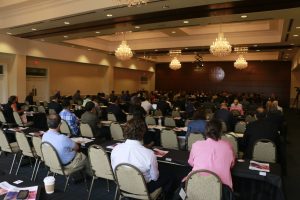A mix of technology experts, digital gurus and government leaders participated in the second University of Mississippi Technology Summit on Thursday.
The summit, also held last year and planned to be held annually, informs the audience about anticipated technological developments and stimulated conversations among leaders in business, education and government.

Annual tech summit draws large crowd to discuss intersections between technology and government.
Wicker, who helped spearhead last year’s inaugural summit, serves as the communications, technology, innovation and internet subcommittee chair of the Senate Commerce Committee.
An array of other speakers took to the podium to discuss about intersections between technology and government.
“It’s an opportunity for us to help the university look for opportunities to grow,” Mayo Flynt, the AT&T Mississippi president, said. “We can provide new and better opportunities for students and help grow a culture of innovation here at Ole Miss.”
Flynt handles external and regulatory affairs, as well as public policy, for AT&T operations in the state. He participated in the roundtable discussion with 16 other industry, education and government leaders.
“I appreciate the chancellor’s leadership, trying to bring tech leaders here to campus to talk about ways that the university can look to grow its STEM program/ I think that’s something Ole Miss can look towards,” said Flynt.
Flynt said he thought the turnout for the event was really good.
“Last year was the first year for the tech summit, and this year, I think it’s grown,” Flynt said. “It’s good to see it growing.”
The event also included panels discussing strong defense and protecting the homeland, expanding access and opportunities to rural communities and unleashing economic innovation.
Blair Watters, an InterDigital representative, said she enjoyed the day’s events.
“I think it’s really interesting to get universities, businesses and government all together in the same room,” Watters said. “It was fantastic. Those three entities need to work together, and there’s not a lot of vendors where they all end up in the same location.”
Chancellor Jeffrey Vitter said it was exciting to explore the future of technology and its role in higher education.






